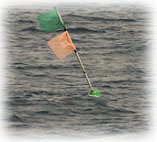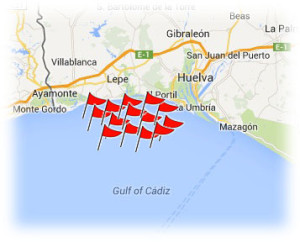Unexpectedly weatherbound and unexpectedly without a towel,
An unexpected chance to see two sides of the Costa del Sol
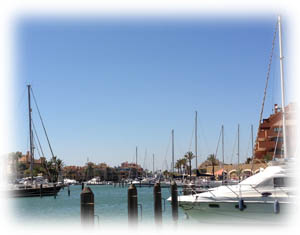
South cones had not been hoisted in Sotogrande the first night we spent there. If they had have been hoisted it would have meant nothing to the Spanish anyway of course. But to a certain generation of Englishmen, a generation rocked gently to their slumbers by the BBC Light Programme’s shipping forecast many decades ago, the meaning would have been clear. And since that certain generation of Englishmen seem to outnumber the Spanish in this particular expat enclave anyway hoisting them mightn’t have been such an unreasonable thing to do after all.
But south cones hadn’t been hoisted that night. This omission wasn’t a gesture of Spanish nationalism at this first marina in the Med past Gibraltar. They wouldn’t have been hoisted anyway since the 20kt+ winds battering our beam the following morning simply weren’t predicted on a single forecast that night. Nor for that matter were they shown on any forecasts or reports the day they were ripping through either.
Maybe we could have got out, maybe the winds would have abated, but then again maybe not and none of us really fancied it anyway. And I had a job to do now too, I had to replace my towel, a task that meant stepping out of Sotogrande and stepping into Spain.
Smir to Sotogrande
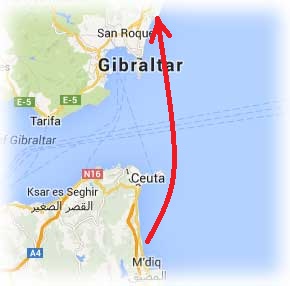 To be fair the weather forecasts had been pretty reliable so far on this trip, at least a day or two ahead they were generally good for wind direction and approximate strength. A well-trailed dearth of wind and abundance of gloom accompanied our departure from Smir that morning for our reasonably full day-sail across the Strait of Gibraltar to Spain. A well-trailed sailing breeze accompanied us through the Strait itself and a well-trailed dearth of wind and abundance of sun greeted us as we motored past Europa Point and on to the Costa del Sol, once more living up to its name.
To be fair the weather forecasts had been pretty reliable so far on this trip, at least a day or two ahead they were generally good for wind direction and approximate strength. A well-trailed dearth of wind and abundance of gloom accompanied our departure from Smir that morning for our reasonably full day-sail across the Strait of Gibraltar to Spain. A well-trailed sailing breeze accompanied us through the Strait itself and a well-trailed dearth of wind and abundance of sun greeted us as we motored past Europa Point and on to the Costa del Sol, once more living up to its name.
Time at sea passes faster under sail than under engine. A word game or two killed a little time as we motored the last leg to Sotogrande before the conversation anticipated our next port of call.
Hmmm, The Hairy Lemon eah? I had a premonition Tony wouldn’t be in that night.
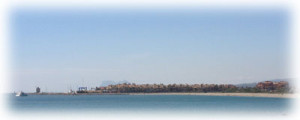 After a long day’s sail an easy pilotage is always welcome and Sotogrande doesn’t disappoint. The RCC pilot states that “The mass of buildings at Puerto Sotogrande can be seen from afar,” a description which, when seeing the rusty red slab of this sprawling development over the bows, seems almost an understatement. We were lassoed against the moorings on the spacious visitor’s quay and checking in at the marina office in double-quick time.
After a long day’s sail an easy pilotage is always welcome and Sotogrande doesn’t disappoint. The RCC pilot states that “The mass of buildings at Puerto Sotogrande can be seen from afar,” a description which, when seeing the rusty red slab of this sprawling development over the bows, seems almost an understatement. We were lassoed against the moorings on the spacious visitor’s quay and checking in at the marina office in double-quick time.
Sotogrande is certainly atypical of modern marinas where the boats are almost always packed against a few floating pontoons arranged in a row. Sotogrande offers this close by the marina office, but in its rambling backwaters it offers much more too – apartment block lined canals and lakes spread back from the sea, lined at points with stern-to boxes possibly aimed at the residents but with space available for visiting boats too. The skipper requested a mooring close to The Spinnaker Bar in the first of these channels back from the main marina. The friendly marina staff not only gave us one right outside the bar but cautioned us of the long walk to the showers before photocopying an A3 plan of the marina to help us find our berth.
About the only challenge was tying up in the box, something none of us had done before and which was made more of a spectacle for the evening diners at The Spinnaker by the skipper putting me on the helm to reverse into it. Not many skippers are happy to let a greenhorn loose on the helm at close quarters and my limited experience (aka competence) certainly showed.
Sotogrande to Southend
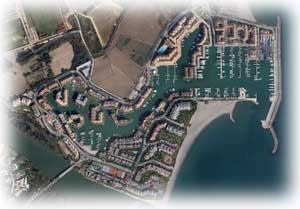 I have two priorities after a day’s sailing – a hot shower and a cold beer. I’ve been repeatedly cautioned about long walks to showers and toilets while sailing in Spain and Portugal only to find it’s an easy five-minute stroll at the most. Maybe this advice is given with the hotter summer weather in mind. Or maybe it’s just the arthritic limbs of the off-season clientele they’re thinking about.
I have two priorities after a day’s sailing – a hot shower and a cold beer. I’ve been repeatedly cautioned about long walks to showers and toilets while sailing in Spain and Portugal only to find it’s an easy five-minute stroll at the most. Maybe this advice is given with the hotter summer weather in mind. Or maybe it’s just the arthritic limbs of the off-season clientele they’re thinking about.
Sotogrande’s showers were not only an easy five-minute stroll from our berth but also remarkably easy to find as a consequence of their being located in the development’s health club. Just head in the right general direction and follow the thumping work-out soundtrack the rest of the way.
Hot shower done it was now cold beer time. And that for us meant it was finally The Hairy Lemon time. My thirst was almost eclipsed by my curiosity.
My premonition had been right though. Tony wasn’t in that night. Or perhaps I just missed him in the huddle of graying hair round the bar.
We repaired to The Spinnaker, a much more restrained affair with excellent pizzas and far less noise (if you discount our group that is). This was also a bar-restaurant with the fine tradition of staying open if the customers are still drinking. The staff suffered more than somewhat that night as a result.
I fell drunkenly into my bunk around two that morning, the second of our party of five to tap the mat. I was expecting a pleasant day sail to Estepona the following day. I was also expecting my towel to still be on the guardrail.
I was to be doubly disappointed.
Sotogrande to Spain
I’m not sure whether it was the howling wind shaking the forepeak that woke me up or whether it was the skipper scrambling on deck to retrieve some washing from the guardrail. He was in time to save part of his but unfortunately not mine.
Our wind instruments registered over twenty knots, forecasts showed little over ten at any point that day. Sure we could head out, our boat would be safe in this and then some, but conditions didn’t lend themselves to comfortable, cosy day sailing, nor did the forecasts give us much confidence in predicting how it would develop.
We repaired to The Spinnaker for a cooked breakfast. Did I detect a hint of terror on the waitress’ face when she heard us discussing potentially spending another night there?
The unplanned free time would come in handy though. The Hitchhiker’s Guide to the Galaxy says that “A towel is about the most massively useful thing an interstellar hitchhiker can have.” It’s pretty damned important for an intercontinental boat whore too!
For all Sotogrande’s space and style it is rather short of useful shops. Fortunately a twenty minute walk to the East along the boardwalk hugging the shore delivers you into the unthrobbing heart of Torreguadiaro, a sleepy little Spanish town showing all the signs of prolonged recession Sotogrande seems to have largely dodged. A couple of chain restaurants and a handful of struggling local cafes and shops add some colour and hope amidst the closed-up shopfronts of its main drag. Amongst the survivors I found a sort of flea-market store hawking a curious selection of snacks, household goods and beach toys where, amongst a collection of incongruously Christmas themed flimsy towels – almost certainly a hangover from the last festive season rather than anticipation of the next – I managed to pick up an emergency towel for a few Euros which would serve me for the rest of my trip.
Well, it would if I didn’t have another DUI that is. Drying under the influence is a risky business on a boat.
Departure to Duquesa
The wind didn’t drop that afternoon. Nor did the forecast increase to match. South cones, if they had been out at all, would not have been dropped in anticipation of calmer seas.
We did escape Sotogrande though. Reading between the lines of the forecast we went for a 4am departure to Duquesa, correctly anticipating a lull in the winds which turned out to be long enough for us to resurface the following morning and make it to Estepona after all.
Slaves to wind and tide sailors need to be a little flexible with their passage plans. You’ll get there in the end so long as your sober moments are long enough for the passages you need to make.
And, of course, if you always have your towel.
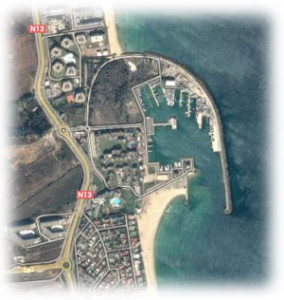
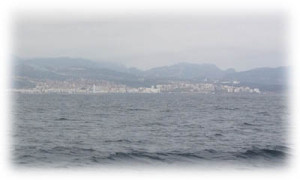 With little over ten miles to run to Smir we had a lazy start leaving Ceuta and found a good sailing breeze …right on our nose. Having motored the short schlep to Punta Almina though we were able to turn sou-sou-west, set the sails and find ourselves on a comfortable broad-reach. M’diq would soon be in sight!
With little over ten miles to run to Smir we had a lazy start leaving Ceuta and found a good sailing breeze …right on our nose. Having motored the short schlep to Punta Almina though we were able to turn sou-sou-west, set the sails and find ourselves on a comfortable broad-reach. M’diq would soon be in sight!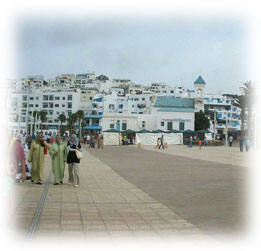 Whilst the skipper mightn’t have been a schoolboy, like all good skippers he was a drinker and as no stranger to M’diq (there’s not a lot of privacy in marina showers!) he knew of an inexpensive and licensed restaurant a short amble along Avenue Lalla Nezha overlooking the seafront (though from the wrong side of this brisk road). The
Whilst the skipper mightn’t have been a schoolboy, like all good skippers he was a drinker and as no stranger to M’diq (there’s not a lot of privacy in marina showers!) he knew of an inexpensive and licensed restaurant a short amble along Avenue Lalla Nezha overlooking the seafront (though from the wrong side of this brisk road). The 